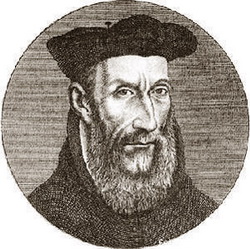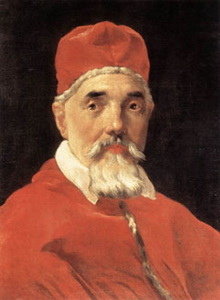|
Etymology.: "Malakia" means ‘the angel of God’.
 Saint Malachy’s Biography Saint Malachy’s Biography
He was born in Armagh, Ireland, in 1094, in the O’Morgair family, according to Saint Bernard of Clairevaux. He was baptized by the name Maelmhaedhoc (Latinized as Malachy). He studied with Imhar O’Hagan and after that with Abbad Armagh. He was ordained as priest by Saint Cellach (Celsus) in 1119.
After his ordination, he continued his liturgical and theological studies at Lismore, San Malchus. In 1132 he was chosen abbot of Bangor and a year later he was consecrated bishop of Connor. In 1132, he was raised to the highest rank in Armagh. Saint Bernard says that Saint Malachy had a great eagerness for religion.
When Saint Cellach (Celsus) died, Saint Malachy was consecrated archbishop of Armagh in 1132, even though in his great lowliness it was hard for him to accept. The intrigues didn’t allow him to take charge of his responsibilities for two years. After three years he reestablished the ecclesiastical discipline in Armagh.
In 1139 he travelled to Rome, and on his way he visited Saint Bernard to Clairvaux. In Rome he was named Papal Legate of Ireland. Returning through Clairvaux he co-opted five monks in order to found in Ireland, in 1142, the Mellifont abbey.
During his second travel to Rome, Saint Malachy got sick as soon as he reached Clairvaux and died in the arms of Saint Bernard on the 2nd of November.
A lot of miracles are assigned to Saint Malachy, but the one for which he is more often mentioned is his gift for prophecies. Among these, the best known is the one regarding the Popes. He was canonized by Pope Clement III, on the 6th of July 1190. He is celebrated on the 3rd of November.
Saint Malachy’s Prophecies
About his own death
 As Saint Bernard mentions, Saint Malachy accurately announced the day of his death (the 2nd of November) while he was with him at the abbey in Clairvaux. As Saint Bernard mentions, Saint Malachy accurately announced the day of his death (the 2nd of November) while he was with him at the abbey in Clairvaux.
About Ireland
He foresaw that Ireland, his country, will be oppressed and persecuted by England, that for seven centuries lots of misfortunes will happen there, but Ireland will keep its faith in God and in His Church against all tests. At the end of this period, it will be released and its oppressors will be punished. Catholic Ireland will play an essential role in England’s return to faith. It is said that this prophecy was copied by Dom Mabillon from an old manuscript at Clairvaux.
About the Popes
The most famous prophecy attributed to Saint Malachy is the one regarding the Popes. It consists of some ‘mottos‘ for each of the 112 Popes, from Celestine II, chosen in 1143, until the end of the world.
 These ‘mottos’ that describe the Popes, can refer to a symbol of his country of origin, to his name, to his coat of arms, to one of his talents or to any other thing referring to the Pope. For example, the ‘motto’ assigned to Urban VIII is Lilium et Rosa; he was from Florence, Italy, and on the coat of arms of Florence appeared the Lily flower. These ‘mottos’ that describe the Popes, can refer to a symbol of his country of origin, to his name, to his coat of arms, to one of his talents or to any other thing referring to the Pope. For example, the ‘motto’ assigned to Urban VIII is Lilium et Rosa; he was from Florence, Italy, and on the coat of arms of Florence appeared the Lily flower.
These prophecies were lost until the XVIth century, when they were published in the book ‘Lignum Vitae‘ of the Benedictine historian Arnold Wion. According to Abbot Cucherat (1871), Saint Malachy wrote the prophecy in Rome, between the years 1139 and 1140, while he was visiting Pope Innocent II in order to report him the problems of his diocese. Then, he handled this manuscript to the Pope in order to comfort him in his torments. The Pope kept the manuscript in the roman archives, where it remained forgotten until its discovery, in 1590 (Cucherat, ‘The Prophecy of the Popes succession’, chap. xv).
The Last Popes
• #101: ‘Crux de Cruce’ (Cross from Cross). Pius IX (1846-1878)
• #102: ‘Lumen in caelo’ (Light in the sky). Leon XIII (1878-1903).
• #103: ‘Ignis ardens’ (Burning fire). Pius X (1903-1914)
• #104: ‘Religio depopulata’ (Devastated religion). Benedict XV (1914-1922).
• #105: ‘Fides intrepida’ (Intrepid faith). Pius XI (1922 –1939).
• #106: ‘Pastor angelicus’ (Angelic shepherd). Pius XII (1939-1958).
Known as a great intellectual and peace defender.
• #107: ‘Pastor y nauta’ (Shepherd and sailor). John XXIII (1958-1963). John XIII was the Cardinal of Venice, a city of sailors. He ruled the Church at the second Council of Vatican.
• #108: ‘Flos florum’ (Flower of flowers). Paul VI (1963-1978).
On his coat of arms appeared the lily flower (the flower of flowers).
• #109: ‘De meditate Lunae’ (of the crescent moon). John Paul I (1978-1978).
John Paul I (1978-1978). His name was Albino Luciani (white light). He was born in the Belluno Diocese (from the latin bella luna). He was chosen on the 26th of August 1978. On the night of 25 to 26, the moon was in the last quarter (half moon). He died on the 28th of September 1978, after a moon eclipse. Also, his birth, his sacerdotal and Episcopal consecration took place in half moon nights.
• #110: ‘De labore solis’ (from the labor of the Sun). John Paul II (1978-2005).
He did a great and vast work. On his birth day and on the day he died there were solar eclipses.
• #111: ‘Gloria Olivae’ (Glory of the olive). Benedict XVI (2005-).
He takes his name from Saint Benedict and Benedict XV. The Benedictines had an order called the Olivetans. Benedict XV distinguished himself for his peace efforts during World War One.
THERE IS ONLY ONE ON THE LIST:
• #112: ‘Petrus Romanus’ (Peter the Roman).
He will be the last Pope, because during his reign the end will come:
During the final persecution of the Roman Church Petrus Romanus will reign (Peter the Roman), who will nourish his believers in many sufferings. After that, the town of the seven hills will be destroyed and the dreaded judge will sentence his people. The end.

 |
 Prophecies
Prophecies  Saint Malachy and his prophecies
Saint Malachy and his prophecies 
